- Home
- David Sedaris
Holidays on Ice Page 10
Holidays on Ice Read online
Page 10
Jesus Shaves
“And what does one do on the fourteenth of July? Does one celebrate Bastille Day?”
It was my second month of French class, and the teacher was leading us in an exercise designed to promote the use of one, our latest personal pronoun.
“Might one sing on Bastille Day?” she asked. “Might one dance in the streets? Somebody give me an answer.”
Printed in our textbooks was a list of major holidays accompanied by a scattered arrangement of photographs depicting French people in the act of celebration. The object of the lesson was to match the holiday with the corresponding picture. It was simple enough but seemed an exercise better suited to the use of the pronoun they. I didn’t know about the rest of the class, but when Bastille Day eventually rolled around, I planned to stay home and clean my oven.
Normally, when working from the book, it was my habit to tune out my fellow students and scout ahead, concentrating on the question I’d calculated might fall to me, but this afternoon we were veering from the usual format. Questions were answered on a volunteer basis, and I was able to sit back and relax, confident that the same few students would do most of the talking. Today’s discussion was dominated by an Italian nanny, two chatty Poles, and a pouty, plump Moroccan woman who had grown up speaking French and had enrolled in the class hoping to improve her spelling. She’d covered these lessons back in the third grade and took every opportunity to demonstrate her superiority. A question would be asked, and she’d race to give the answer, behaving as though this were a game show and, if quick enough, she might go home with a tropical vacation or a side-by-side refrigerator/freezer. A transfer student, by the end of her first day she’d raised her hand so many times that her shoulder had given out. Now she just leaned back and shouted out the answers, her bronzed arms folded across her chest like some great grammar genie.
We’d finished discussing Bastille Day, and the teacher had moved on to Easter, which was represented in our textbooks by a black-and-white photograph of a chocolate bell lying upon a bed of palm fronds.
“And what does one do on Easter?” she asked. “Would anyone like to tell us?”
The Italian nanny was attempting to answer when the Mor occan student interrupted, shouting, “Excuse me, but what’s an Easter?”
It would seem that despite having grown up in a Muslim country, she would have heard it mentioned once or twice, but no. “I mean it,” she said. “I have no idea what you people are talking about.”
Our teacher then called upon the rest of us to explain.
The Poles led the charge to the best of their ability. “It is,” said one, “a party for the little boy of God who call his self Jesus and . . .” She faltered and her fellow countryman came to her aid.
“He call his self Jesus and then he die one day on two… morsels of… lumber.”
The rest of the class jumped in, offering bits of information that would have given the pope an aneurysm.
“He die one day and then he go above of my head to live with your father.”
“He weared of himself the long hair and after he die, the first day he come back here for to say hello to the peoples.”
“He nice, the Jesus.”
“He make the good things, and on the Easter we be sad because somebody makes him dead today.”
Part of the problem had to do with vocabulary. Simple nouns such as cross and resurrection were beyond our grasp, let alone such complicated reflexive phrases as “to give of yourself your only begotten son.” Faced with the challenge of explaining the cornerstone of Christianity, we did what any self-respecting group of people might do. We talked about food instead.
“ Easter is a party for to eat of the lamb,” the Italian nanny explained. “One too may eat of the chocolate.”
“And who brings the chocolate?” the teacher asked.
I knew the word, so I raised my hand, saying, “The rabbit of Easter. He bring of the chocolate.”
“A rabbit?” The teacher, assuming I’d used the wrong word, positioned her index fingers on top of her head, wriggling them as though they were ears. “You mean one of these? A rabbit rabbit?”
“Well, sure,” I said. “He come in the night when one sleep on a bed. With a hand he have a basket and foods.”
The teacher sighed and shook her head. As far as she was concerned, I had just explained everything that was wrong with my country. “No, no,” she said. “Here in France the chocolate is brought by a big bell that flies in from Rome.”
I called for a time-out. “But how do the bell know where you live?”
“Well,” she said, “how does a rabbit?”
It was a decent point, but at least a rabbit has eyes. That’s a start. Rabbits move from place to place, while most bells can only go back and forth — and they can’t even do that on their own power. On top of that, the Easter Bunny has character. He’s someone you’d like to meet and shake hands with. A bell has all the personality of a cast-iron skillet. It’s like saying that come Christmas, a magic dustpan flies in from the North Pole, led by eight flying cinder blocks. Who wants to stay up all night so they can see a bell? And why fly one in from Rome when they’ve got more bells than they know what to do with right here in Paris? That’s the most implausible aspect of the whole story, as there’s no way the bells of France would allow a foreign worker to fly in and take their jobs. That Roman bell would be lucky to get work cleaning up after a French bell’s dog — and even then he’d need papers. It just didn’t add up.
Nothing we said was of any help to the Moroccan student. A dead man with long hair supposedly living with her father, a leg of lamb served with palm fronds and chocolate; equally confused and disgusted, she shrugged her massive shoulders and turned her attention back to the comic book she kept hidden beneath her binder.
I wondered then if, without the language barrier, my classmates and I could have done a better job making sense of Christianity, an idea that sounds pretty far-fetched to begin with.
In communicating any religious belief, the operative word is faith, a concept illustrated by our very presence in that classroom. Why bother struggling with the grammar lessons of a six-year-old if each of us didn’t believe that, against all reason, we might eventually improve? If I could hope to one day carry on a fluent conversation, it was a relatively short leap to believing that a rabbit might visit my home in the middle of the night, leaving behind a handful of chocolate kisses and a carton of menthol cigarettes. So why stop there? If I could believe in myself, why not give other improbabilities the benefit of the doubt? I told myself that despite her past behavior, my teacher was a kind and loving person who had only my best interests at heart. I accepted the idea that an omniscient God had cast me in his own image and that he watched over me and guided me from one place to the next. The Virgin Birth, the Resurrection, and the countless miracles — my heart expanded to encompass all the wonders and possibilities of the universe.
A bell, though — that’s fucked up.
Us and Them
When my family first moved to North Carolina, we lived in a rented house three blocks from the school where I would begin the third grade. My mother made friends with one of the neighbors, but one seemed enough for her. Within a year we would move again and, as she explained, there wasn’t much point in getting too close to people we would have to say good-bye to. Our next house was less than a mile away, and the short journey would hardly merit tears or even good-byes, for that matter. It was more of a “see you later” situation, but still I adopted my mother’s attitude, as it allowed me to pretend that not making friends was a conscious choice. I could if I wanted to. It just wasn’t the right time.
Back in New York State, we had lived in the country, with no sidewalks or streetlights; you could leave the house and still be alone. But here, when you looked out the window, you saw other houses, and people inside those houses. I hoped that in walking around after dark I might witness a murder, but for the most part our neighbors j
ust sat in their living rooms, watching TV. The only place that seemed truly different was owned by a man named Mr. Tomkey, who did not believe in television. This was told to us by our mother’s friend, who dropped by one afternoon with a basketful of okra. The woman did not editorialize — rather, she just presented her information, leaving her listener to make of it what she might. Had my mother said, “That’s the craziest thing I’ve ever heard in my life,” I assume that the friend would have agreed, and had she said, “Three cheers for Mr. Tomkey,” the friend likely would have agreed as well. It was a kind of test, as was the okra.
To say that you did not believe in television was different from saying that you did not care for it. Belief implied that television had a master plan and that you were against it. It also suggested that you thought too much. When my mother reported that Mr. Tomkey did not believe in television, my father said, “Well, good for him. I don’t know that I believe in it, either.”
“That’s exactly how I feel,” my mother said, and then my parents watched the news, and whatever came on after the news.
Word spread that Mr. Tomkey did not own a television, and you began hearing that while this was all very well and good, it was unfair of him to inflict his beliefs upon others, specifically his innocent wife and children. It was speculated that just as the blind man develops a keener sense of hearing, the family must somehow compensate for their loss. “Maybe they read,” my mother’s friend said. “Maybe they listen to the radio, but you can bet your boots they’re doing something.”
I wanted to know what this something was, and so I began peering through the Tomkeys’ windows. During the day I’d stand across the street from their house, acting as though I were waiting for someone, and at night, when the view was better and I had less chance of being discovered, I would creep into their yard and hide in the bushes beside their fence.
Because they had no TV, the Tomkeys were forced to talk during dinner. They had no idea how puny their lives were, and so they were not ashamed that a camera would have found them uninteresting. They did not know what attractive was or what dinner was supposed to look like or even what time people were supposed to eat. Sometimes they wouldn’t sit down until eight o’clock, long after everyone else had finished doing the dishes. During the meal, Mr. Tomkey would occasionally pound the table and point at his children with a fork, but the moment he finished, everyone would start laughing. I got the idea that he was imitating someone else, and wondered if he spied on us while we were eating.
When fall arrived and school began, I saw the Tomkey children marching up the hill with paper sacks in their hands. The son was one grade lower than me, and the daughter was one grade higher. We never spoke, but I’d pass them in the halls from time to time and attempt to view the world through their eyes. What must it be like to be so ignorant and alone? Could a normal person even imagine it? Staring at an Elmer Fudd lunch box, I tried to divorce myself from everything I already knew: Elmer’s inability to pronounce the letter r, his constant pursuit of an intelligent and considerably more famous rabbit. I tried to think of him as just a drawing, but it was impossible to separate him from his celebrity.
One day in class a boy named William began to write the wrong answer on the blackboard, and our teacher flailed her arms, saying, “Warning, Will. Danger, danger.” Her voice was synthetic and void of emotion, and we laughed, knowing that she was imitating the robot in a weekly show about a family who lived in outer space. The Tomkeys, though, would have thought she was having a heart attack. It occurred to me that they needed a guide, someone who could accompany them through the course of an average day and point out all the things they were unable to understand. I could have done it on weekends, but friendship would have taken away their mystery and interfered with the good feeling I got from pitying them. So I kept my distance.
In early October the Tomkeys bought a boat, and everyone seemed greatly relieved, especially my mother’s friend, who noted that the motor was definitely secondhand. It was reported that Mr. Tomkey’s father-in-law owned a house on the lake and had invited the family to use it whenever they liked. This explained why they were gone all weekend, but it did not make their absences any easier to bear. I felt as if my favorite show had been canceled.
Halloween fell on a Saturday that year, and by the time my mother took us to the store, all the good costumes were gone. My sisters dressed as witches and I went as a hobo. I’d looked forward to going in disguise to the Tomkeys’ door, but they were off at the lake, and their house was dark. Before leaving, they had left a coffee can full of gumdrops on the front porch, alongside a sign reading DON’T BE GREEDY. In terms of Halloween candy, individual gumdrops were just about as low as you could get. This was evidenced by the large number of them floating in an adjacent dog bowl. It was disgusting to think that this was what a gumdrop might look like in your stomach, and it was insulting to be told not to take too much of something you didn’t really want in the first place. “Who do these Tomkeys think they are?” my sister Lisa said.
The night after Halloween, we were sitting around watching TV when the doorbell rang. Visitors were infrequent at our house, so while my father stayed behind, my mother, sisters, and I ran downstairs in a group, opening the door to discover the entire Tomkey family on our front stoop. The parents looked as they always had, but the son and daughter were dressed in costumes — she as a ballerina and he as some kind of a rodent with terry-cloth ears and a tail made from what looked to be an extension cord. It seemed they had spent the previous evening isolated at the lake and had missed the opportunity to observe Halloween. “So, well, I guess we’re trick-or-treating now, if that’s okay,” Mr. Tomkey said.
I attributed their behavior to the fact that they didn’t have a TV, but television didn’t teach you everything. Asking for candy on Halloween was called trick-or-treating, but asking for candy on November first was called begging, and it made people uncomfortable. This was one of the things you were supposed to learn simply by being alive, and it angered me that the Tomkeys did not understand it.
“Why of course it’s not too late,” my mother said. “Kids, why don’t you… run and get… the candy.”
“But the candy is gone,” my sister Gretchen said. “You gave it away last night.”
“Not that candy,” my mother said. “The other candy. Why don’t you run and go get it?”
“You mean our candy?” Lisa said. “The candy that we earned?”
This was exactly what our mother was talking about, but she didn’t want to say this in front of the Tomkeys. In order to spare their feelings, she wanted them to believe that we always kept a bucket of candy lying around the house, just waiting for someone to knock on the door and ask for it. “Go on, now,” she said. “Hurry up.”
My room was situated right off the foyer, and if the Tomkeys had looked in that direction, they could have seen my bed and the brown paper bag marked MY CANDY. KEEP OUT. I didn’t want them to know how much I had, and so I went into my room and shut the door behind me. Then I closed the curtains and emptied my bag onto the bed, searching for whatever was the crummiest. All my life chocolate has made me ill. I don’t know if I’m allergic or what, but even the smallest amount leaves me with a blinding headache. Eventually, I learned to stay away from it, but as a child I refused to be left out. The brownies were eaten, and when the pounding began I would blame the grape juice or my mother’s cigarette smoke or the tightness of my glasses — anything but the chocolate. My candy bars were poison but they were brand-name, and so I put them in pile no. 1, which definitely would not go to the Tomkeys.
Out in the hallway I could hear my mother straining for something to talk about. “A boat!” she said. “That sounds marvelous. Can you just drive it right into the water?”
“Actually, we have a trailer,” Mr. Tomkey said. “So what we do is back it into the lake.”
“Oh, a trailer. What kind is it?”
“Well, it’s a boat trailer,” Mr. Tomkey said.
“Right, but is it wooden or, you know… I guess what I’m asking is what style trailer do you have?”
Behind my mother’s words were two messages. The first and most obvious was “Yes, I am talking about boat trailers, but also I am dying.” The second, meant only for my sisters and me, was “If you do not immediately step forward with that candy, you will never again experience freedom, happiness, or the possibility of my warm embrace.”
I knew that it was just a matter of time before she came into my room and started collecting the candy herself, grabbing indiscriminately, with no regard to my rating system. Had I been thinking straight, I would have hidden the most valuable items in my dresser drawer, but instead, panicked by the thought of her hand on my doorknob, I tore off the wrappers and began cramming the candy bars into my mouth, desperately, like someone in a contest. Most were miniature, which made them easier to accommodate, but still there was only so much room, and it was hard to chew and fit more in at the same time. The headache began immediately, and I chalked it up to tension.

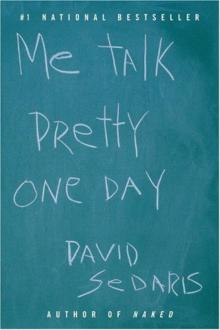 Me Talk Pretty One Day
Me Talk Pretty One Day Calypso
Calypso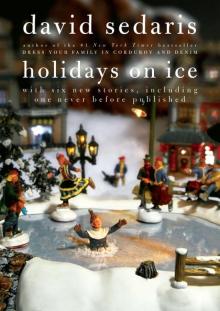 Holidays on Ice
Holidays on Ice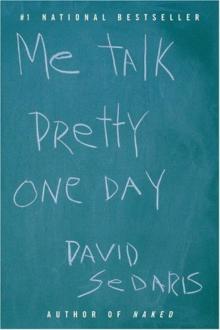 Mi vida en rose
Mi vida en rose 1994 - Barrel Fever
1994 - Barrel Fever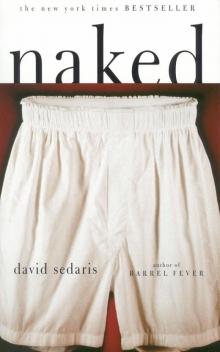 Naked
Naked Dress Your Family in Corduroy and Denim
Dress Your Family in Corduroy and Denim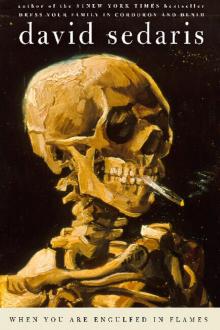 When You Are Engulfed in Flames
When You Are Engulfed in Flames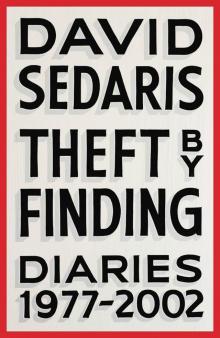 Theft by Finding: Diaries 1977-2002
Theft by Finding: Diaries 1977-2002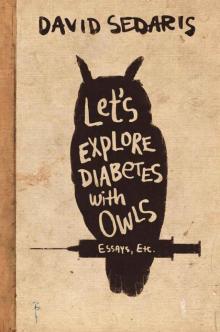 Let's Explore Diabetes With Owls
Let's Explore Diabetes With Owls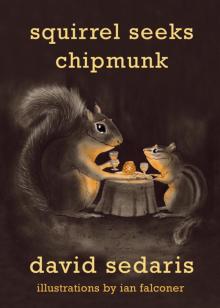 Squirrel Seeks Chipmunk: A Modest Bestiary
Squirrel Seeks Chipmunk: A Modest Bestiary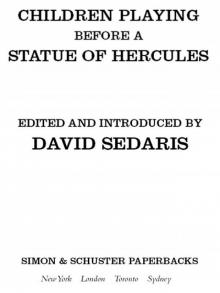 Children Playing Before a Statue of Hercules
Children Playing Before a Statue of Hercules The Best of Me
The Best of Me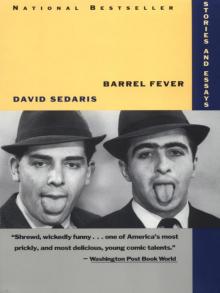 Barrel Fever
Barrel Fever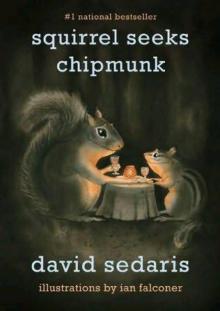 Squirrel Seeks Chipmunk
Squirrel Seeks Chipmunk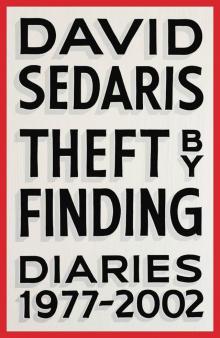 Theft by Finding
Theft by Finding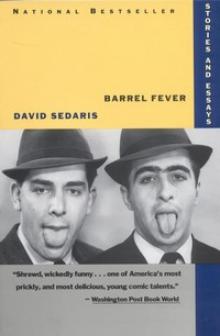 Barrel Fever and Other Stories
Barrel Fever and Other Stories